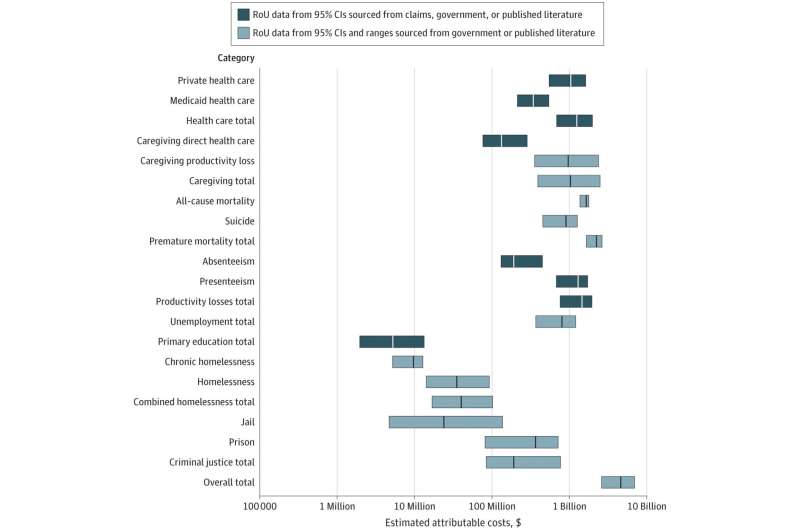This article has been reviewed according to Science X's editorial process and policies. Editors have highlighted the following attributes while ensuring the content's credibility:
fact-checked
peer-reviewed publication
trusted source
proofread
Untreated mental illness costs Indiana more than $4 billion each year, study reveals

A new study from the IU Richard M. Fairbanks School of Public Health reveals the economic burden of untreated mental illness in Indiana, which results in $4.2 billion spent annually.
"These costs represent a significant public health and financial challenge for our state," said Heather Taylor, lead author on the study and assistant professor at the Fairbanks School. "When you measure this across the state, every year there is a loss of over $600 for every person, or nearly $1,600 per family. Untreated mental illness is a hugely consequential cost for Hoosiers."
The research found that one in five Indiana residents with mental illness do not receive the treatment they need. Individuals who do not receive such treatment are more likely to experience other chronic health conditions, such as diabetes and cardiovascular disease.
The findings were published Oct. 13 in the Journal of the American Medical Association in an article titled, "Economic Burden Associated with Untreated Mental Illness in Indiana." An accompanying podcast from JAMA was released the same day.
The largest cost attributable to untreated mental illness was premature mortality, at over $1.4 billion. Productivity losses were estimated to cost $885 million each year. Other factors include direct health care costs, incarceration, homeless shelter costs and caregiving, totaling:
- $142 million to Medicaid.
- $567 million to private insurers.
- $106 million to Indiana's criminal justice system.
- $9.9 million to Indiana through homeless supports.
- $566 million for caregiving.
- $407 million in unemployment for those unable to work.
"Another way to look at this is that, with the average wage in Indiana of $20.05 an hour, the loss of over $4 billion dollars each year represents 100,000 jobs," Taylor said. "In 2018, the leading agricultural product for Indiana was corn, which had $3.8 billion in sales."
The researchers worked with the Indiana Behavioral Health Commission to perform their analysis. The research was used in support of Senate Bill 1, which was known as Behavioral Health Matters. In the spring of 2023, this bill expanded access to mental health support in Indiana through community health centers and established the 988 mental health crisis hotline.
Through the researchers' work, they developed a framework that allows Indiana to prioritize key areas in mental health services and treatment. The framework also provides Indiana with a baseline for tracking progress toward improvement efforts.
"One of the most significant impacts of this research is that other states can use this framework to understand the financial burden in their state," said Justin Blackburn, associate professor at the Fairbanks School. "There is a scarcity of data on the costs incurred by each state—especially by individuals, families and communities—from untreated mental illnesses in the United States. Policymakers, clinicians and employers need this sort of data to determine how we should allocate our societal resources."
Investing in interventions that improve access to and delivery of mental health services will reduce the economic burden to the state. Cost savings can be achieved by:
- Strengthening the mental health provider workforce.
- Improving access to mental health services.
- Ensuring that policies enable providers to use the full range of treatment options.
- Reducing barriers to treatment initiation such as transportation challenges.
- Increasing awareness and reducing stigma around mental illness.
- Encouraging employers to support mental health initiatives.
"Our report is not meant to be a cost-effectiveness analysis," Taylor said. "Indiana will need to invest in mental health services to realize financial returns."
More information: Heather L. Taylor et al, Economic Burden Associated With Untreated Mental Illness in Indiana, JAMA Health Forum (2023). DOI: 10.1001/jamahealthforum.2023.3535




















